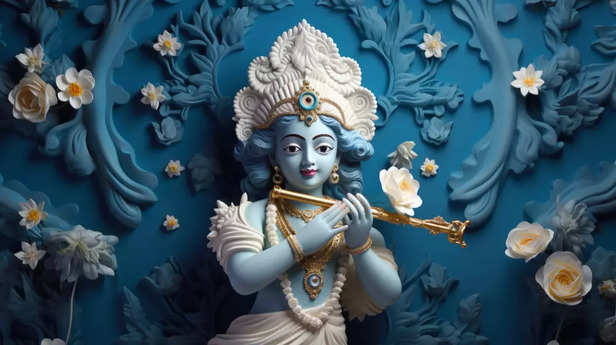Why Arjuna Calls Krishna ‘Madhusudan’ in the Bhagavad Gita
Tarun Badghaiya | Apr 01, 2025, 17:33 IST
krishna
In the Bhagavad Gita, Arjuna refers to Krishna as "Madhusudan," which translates as "slayer of Madhu." This term is derived from Hindu mythology, when Lord Vishnu (Krishna) vanquished the demon Madhu, who represented chaos and ignorance. Arjuna uses this moniker to remind himself of Krishna's power and capacity to vanquish not just exterior opponents but also internal doubts and worries. The essay delves into the meaning, mythological background, and philosophical relevance of this title, demonstrating how Krishna's function as Madhusudan goes beyond mythology to act as a guiding force in overcoming life's problems.
In the Bhagavad Gita, Arjuna often addresses Krishna by different names, each carrying a deep meaning. One such name is "Madhusudan." But why does Arjuna call him that? What does it represent? To understand this, we need to explore its meaning, its mythological background, and its relevance in the context of the Gita.
The name "Madhusudan" is made up of two Sanskrit words:
Madhu, which means honey, sweetness, or even the name of a demon.
Sudan means slayer or destroyer.
So, "Madhusudan" means "the slayer of Madhu." But who was Madhu, and why is this relevant?
Long before the events of the Mahabharata, a great demon named Madhu was causing havoc in the universe. According to Hindu legend, Madhu and his brother Kaitabha sprouted from Lord Vishnu's earwax while he was reclining in cosmic sleep. They obtained enormous power through penance and became so arrogant that they dared the gods themselves.
They stole the Vedas, Hinduism's ancient scriptures, and hid them, throwing the world into darkness. Lord Vishnu, seeing this, attacked them. After a lengthy battle, he fought and killed both demons, reclaiming the Vedas and restoring cosmic balance. This triumph gave him the moniker "Madhusudan."

During the Battle of Kurukshetra, Arjuna experiences intense emotional agony. When confronted with the terrifying reality of fighting his own relatives, professors, and friends, he is overcome with doubt and despair. He seeks advice from Krishna, whom he addresses as "Madhusudan."
There are several main reasons why Arjuna selects this name at that time:
1. A Reminder of Krishna's Strength By referring to Krishna as "Madhusudan," Arjuna reminds himself that Krishna is the same holy person who killed the monster Madhu. If Krishna can defeat such a terrible enemy, he can definitely help Arjuna conquer his inner struggle.
2. Madhu, the destroyer of evil and ignorance, represented darkness, ignorance, and disorder. Similarly, Arjuna is dealing with his own "inner demons": fear, hesitancy, and bewilderment. By addressing Krishna as "Madhusudan," Arjuna acknowledges Krishna's capacity to conquer both outward foes and internal defects.
3. A Request for Assistance: When Arjuna addresses Krishna by this name, it is almost like an unconscious scream for help. He is asking Krishna to clear his mind, erase his uncertainties, and give him the courage to do the right thing, just as Krishna once removed Madhu's threat.

Beyond mythology, the name "Madhusudan" has a deeper spiritual significance. It represents Krishna's position as a mentor who helps people overcome their particular challenges. As he killed Madhu, he helped people destroy undesirable emotions such as:
Fear, which prevents us from doing what is right.
Doubt clouded our judgement and prevented us from making clear decisions.
Attachment makes it harder to accept change or loss.
For Arjuna, Krishna is more than a buddy or a charioteer; he is the one who can guide him out of his darkness and into the light of wisdom.
Krishna's narrative as "Madhusudan" involves more than merely an ancient conflict. It's a lesson for all of us. Everyone faces their own "Madhu" in life—be it in the form of self-doubt, fear, stress, or negative thoughts.
In difficult times, we need a guiding force, just as Arjuna needed Krishna. Whether we find it in spirituality, wisdom, or the support of loved ones, the message remains the same: we must overcome our inner struggles to move forward in life.

In the Bhagavad Gita, Arjuna's choice to refer to Krishna as "Madhusudan" is more than just a casual term. It displays his strong belief in Krishna's ability to overcome both external and internal barriers. It serves as a reminder that Krishna, as the divine energy, aids in the defeat of mental and emotional fights as well as physical ones.
So, the next time you confront a struggle or are confused, remember "Madhusudan"—the one who destroys darkness and offers insight. Just as Krishna guided Arjuna, wisdom and faith can help us find our way through the toughest moments of life.
Explore the latest trends and tips in Health and Fitness, , Travel, Life Hacks, Fashion & Beauty, and Relationships at Times Life
What Exactly Does 'Madhusudan' Mean?
Madhu, which means honey, sweetness, or even the name of a demon.
Sudan means slayer or destroyer.
So, "Madhusudan" means "the slayer of Madhu." But who was Madhu, and why is this relevant?
The Meaning behind the Name
They stole the Vedas, Hinduism's ancient scriptures, and hid them, throwing the world into darkness. Lord Vishnu, seeing this, attacked them. After a lengthy battle, he fought and killed both demons, reclaiming the Vedas and restoring cosmic balance. This triumph gave him the moniker "Madhusudan."

KRISHNA
Why Does Arjuna Call Krishna 'Madhusudan'?
There are several main reasons why Arjuna selects this name at that time:
1. A Reminder of Krishna's Strength By referring to Krishna as "Madhusudan," Arjuna reminds himself that Krishna is the same holy person who killed the monster Madhu. If Krishna can defeat such a terrible enemy, he can definitely help Arjuna conquer his inner struggle.
2. Madhu, the destroyer of evil and ignorance, represented darkness, ignorance, and disorder. Similarly, Arjuna is dealing with his own "inner demons": fear, hesitancy, and bewilderment. By addressing Krishna as "Madhusudan," Arjuna acknowledges Krishna's capacity to conquer both outward foes and internal defects.
3. A Request for Assistance: When Arjuna addresses Krishna by this name, it is almost like an unconscious scream for help. He is asking Krishna to clear his mind, erase his uncertainties, and give him the courage to do the right thing, just as Krishna once removed Madhu's threat.

krishna
The deeper meaning of 'Madhusudan'
Fear, which prevents us from doing what is right.
Doubt clouded our judgement and prevented us from making clear decisions.
Attachment makes it harder to accept change or loss.
For Arjuna, Krishna is more than a buddy or a charioteer; he is the one who can guide him out of his darkness and into the light of wisdom.
How This Applies to Our Lives
In difficult times, we need a guiding force, just as Arjuna needed Krishna. Whether we find it in spirituality, wisdom, or the support of loved ones, the message remains the same: we must overcome our inner struggles to move forward in life.

krishna
In the Bhagavad Gita, Arjuna's choice to refer to Krishna as "Madhusudan" is more than just a casual term. It displays his strong belief in Krishna's ability to overcome both external and internal barriers. It serves as a reminder that Krishna, as the divine energy, aids in the defeat of mental and emotional fights as well as physical ones.
So, the next time you confront a struggle or are confused, remember "Madhusudan"—the one who destroys darkness and offers insight. Just as Krishna guided Arjuna, wisdom and faith can help us find our way through the toughest moments of life.
Explore the latest trends and tips in Health and Fitness, , Travel, Life Hacks, Fashion & Beauty, and Relationships at Times Life
